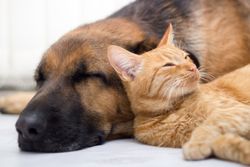How Mold Can Affect Your Pet's Health

When mold and mildew grow in your home, your health may be at risk. The same is true for your pets, who could develop serious illnesses after being exposed to harmful spores. Review this guide to learn how mold can affect your pets and why mold remediation is so important.
How Does Mold Affect Your Pet’s Health?
Potential Problems
Mold typically enters the bodies of humans and animals via inhalation or ingestion. Molds that produce mycotoxins, such as black mold, are particularly dangerous and may cause liver or gastrointestinal damage, in addition to other conditions. Some animals are more susceptible to mold poisoning than others, but prolonged exposure makes neurological issues and allergic reactions more likely.
Symptoms of Exposure
 If your pet develops mold poisoning, you may notice watery eyes, coughing, sneezing, rapid breathing, nosebleeds, or lethargy. Other common symptoms include excessive licking or scratching, rashes, skin sores, loss of appetite, vomiting, or diarrhea. In severe cases, your animal pet may have seizures or convulsions. If you notice any of these symptoms, take your pet to an emergency vet immediately.
If your pet develops mold poisoning, you may notice watery eyes, coughing, sneezing, rapid breathing, nosebleeds, or lethargy. Other common symptoms include excessive licking or scratching, rashes, skin sores, loss of appetite, vomiting, or diarrhea. In severe cases, your animal pet may have seizures or convulsions. If you notice any of these symptoms, take your pet to an emergency vet immediately.
Keeping Pets Safe
The best way to protect your pet from mold exposure is by scheduling professional inspections. If your property is compromised, a mold remediation company will safely clean and remove the harmful spores. Keep mold from growing in your bathrooms, basements, and other particularly damp areas by minimizing indoor moisture levels with a dehumidifier. Additionally, wash your pet’s bowls, toys, and bedding every other week.
Keep your family and pets safe from harmful microbes by scheduling mold remediation from America’s Best Cleaning & Restoration Services. For over 30 years, they’ve provided water damage restoration, carpet and upholstery cleaning, and pressure washing to residents in the La Crosse, WI, area. Call (608) 782-6995 to get a quote for mold remediation, or visit them online to learn more their services.
About the Business
Have a question? Ask the experts!
Send your question

